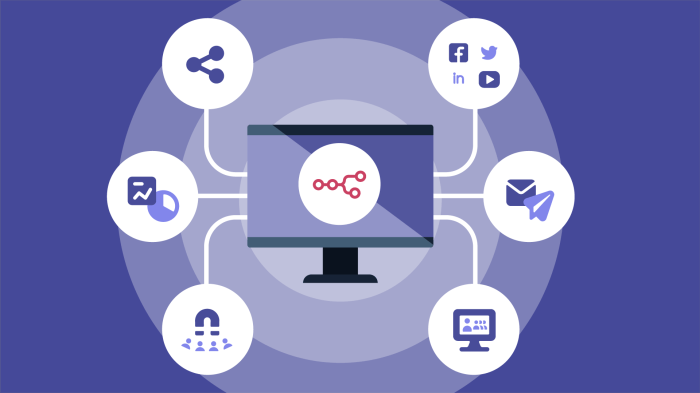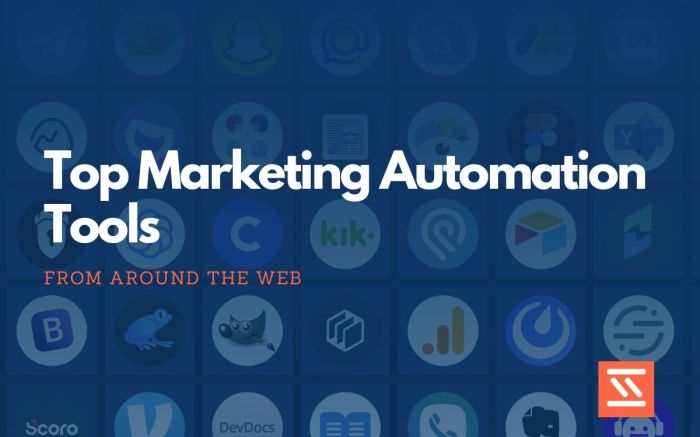Understanding Marketing Automation Tools delves into the world of modern business strategies, where automation plays a key role in enhancing efficiency and effectiveness. From streamlining repetitive tasks to maximizing business potential, this topic explores the ins and outs of marketing automation tools.
As businesses strive to stay ahead in a competitive landscape, the use of marketing automation tools has become essential for driving growth and achieving success. Dive into this comprehensive guide to uncover the power and impact of these tools on businesses of all sizes.
What is Marketing Automation?

Marketing automation is a technology that helps businesses automate repetitive marketing tasks, allowing them to streamline their marketing campaigns and increase efficiency. By using marketing automation tools, companies can schedule, track, and analyze their marketing efforts in a more organized and efficient way.
Significance of Marketing Automation
- Automates Email Marketing: Marketing automation tools like Mailchimp and HubSpot allow businesses to send personalized emails to their customers based on their behavior, preferences, and interactions with the brand.
- Lead Nurturing: Tools like Marketo and Pardot help in nurturing leads by sending targeted content to prospects at different stages of the sales funnel, increasing the chances of converting them into customers.
- Social Media Management: Platforms like Hootsuite and Buffer enable businesses to schedule and manage their social media posts across multiple platforms, saving time and ensuring consistent branding.
- Analytics and Reporting: Marketing automation tools provide valuable insights into the performance of marketing campaigns, allowing businesses to make data-driven decisions and optimize their strategies for better results.
Benefits of Implementing Marketing Automation Tools
- Increased Efficiency: By automating repetitive tasks, businesses can save time and resources, allowing their marketing teams to focus on more strategic initiatives.
- Improved Lead Generation: Marketing automation tools help in capturing and nurturing leads effectively, leading to higher conversion rates and better ROI.
- Personalized Customer Engagement: With the ability to segment and target customers based on their preferences, businesses can deliver more personalized and relevant content, enhancing customer engagement and loyalty.
- Scalability and Growth: Marketing automation tools are scalable and can adapt to the needs of growing businesses, ensuring that marketing efforts remain efficient and effective as the company expands.
Types of Marketing Automation Tools
Marketing automation tools come in various types, each serving a specific function to help businesses streamline their marketing efforts and engage with their audience more effectively.
Email Marketing
Email marketing automation tools allow businesses to create and send personalized emails to their subscribers at scale. These tools often include features like email templates, segmentation, and scheduling to optimize email campaigns for better engagement and conversion rates.
Social Media Scheduling, Understanding Marketing Automation Tools
Social media automation tools enable businesses to plan and schedule posts across various social media platforms. They help maintain a consistent presence online by automating the publishing process and analyzing post performance to improve content strategy.
Lead Nurturing
Lead nurturing tools help businesses build relationships with potential customers by delivering targeted content based on their behavior and interests. These tools track lead interactions and provide insights to sales teams, allowing for personalized communication to move leads through the sales funnel.
Comparison of Features and Pricing
When comparing different marketing automation tools, businesses should consider factors like ease of use, integration capabilities, reporting features, and pricing. Some tools may offer advanced functionalities like AI-powered analytics or CRM integration, while others may be more budget-friendly for small businesses.
Real-World Examples
For example, a clothing brand may use email marketing automation to send personalized product recommendations based on customer preferences. A software company could leverage social media scheduling tools to maintain a consistent posting schedule across platforms. In contrast, a B2B company might use lead nurturing tools to provide targeted content to prospects based on their engagement with the website.
Implementing Marketing Automation Tools: Understanding Marketing Automation Tools
When it comes to setting up a marketing automation tool for a business, there are several key steps to consider. First, you’ll need to choose the right tool that aligns with your marketing goals and objectives. Next, you’ll need to set up your account, configure your settings, and integrate the tool with your existing systems. Once everything is in place, you can start creating automation workflows to streamline your marketing processes.
Integrating Marketing Automation Tools with Existing Systems
Integrating marketing automation tools with your existing systems is crucial for ensuring seamless communication and data flow. Here are some best practices to keep in mind:
- Ensure compatibility between your automation tool and existing systems
- Map out your data flow and establish clear integration points
- Regularly monitor and test your integrations to identify and address any issues
Creating Effective Marketing Automation Workflows
Creating effective marketing automation workflows is essential for maximizing the impact of your automation efforts. Here are some tips to help you create workflows that drive results:
- Identify key touchpoints in the customer journey to target with automation
- Personalize your messages and content to increase engagement
- Set clear goals and metrics to track the performance of your workflows
Measuring the Success of Marketing Automation Efforts
Measuring the success of your marketing automation efforts is crucial for optimizing your strategies and achieving your goals. Here are some metrics to consider when evaluating the effectiveness of your automation campaigns:
- Conversion rates
- Engagement metrics (open rates, click-through rates, etc.)
- ROI and revenue generated from automated campaigns
Challenges and Considerations

Implementing marketing automation tools can be a game-changer for businesses, but it also comes with its fair share of challenges. From data security concerns to selecting the right tool, there are several factors to consider to ensure successful implementation.
Common Challenges and Solutions
- Challenge: Lack of internal expertise in using marketing automation tools.
- Solution: Invest in training programs or hire specialists to bridge the knowledge gap.
- Challenge: Integrating marketing automation tools with existing systems.
- Solution: Work closely with IT teams to ensure seamless integration and data flow.
- Challenge: Generating quality leads and maximizing lead nurturing.
- Solution: Develop targeted content strategies and personalized campaigns to engage leads effectively.
Key Factors for Selecting the Right Tool
- Consider the scalability of the tool to align with future growth.
- Assess the ease of use and customization options for your specific business needs.
- Evaluate the pricing structure and support services offered by the tool provider.
Data Security and Compliance
- Ensure the marketing automation tool complies with data protection regulations like GDPR.
- Implement encryption and access controls to safeguard sensitive customer information.
- Regularly audit and monitor data handling processes to maintain compliance standards.






